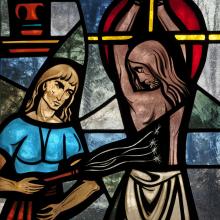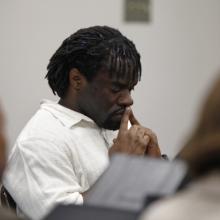Death Penalty
For Catholics—and many others—what happens in Rome doesn’t stay in Rome. The seating of a new pope has the power to affect believers across the globe, in ways direct, indirect, and unpredictable. And when a surprising sea change occurs in a hide-bound, steeped-in-tradition place like the Vatican—the unexpected resignation of a pope, the selection of a Jesuit from the Americas as his replacement, and the powerful symbolism of a new leader who literally stoops to wash a Muslim woman’s feet—people of faith of all traditions sit up and take notice.
In these early days of Francis’ papacy, we asked three prominent Catholic thinkers and leaders to help us understand what it all might mean. How will the spirit of reform that has marked Pope Francis’ first few months in office affect the worldwide church? Will change at the top trickle down to parishes and neighborhoods here in the United States and elsewhere? And what will Francis’ leadership mean not only for Catholics, but for all people of faith engaged in the work of making justice and building peace? —The Editors
CATHOLICS AROUND THE WORLD are transfixed by Pope Francis. We love his simplicity of life, his humble faith, his welcoming attitude to all, and his way of being Christian in the contemporary world that takes its bearings from the poor. Lace and gilt are no longer fashion statements at the Vatican. From his small apartment, the pope speaks bluntly about worrying less about rules and more about love. An utterly refreshing breeze blows through the Catholic Church.
But what does it really mean for Catholics today? The church still reels with the moral and spiritual damage done by members of the clergy as perpetrators or accomplices in the sex abuse scandals, from fiscal mismanagement, and from institutional infighting. Does Pope Francis change that? And what does the new pope signify for the young, for women, and for the many issues that vex the church’s engagement in today’s world?
A Philadelphia abortion doctor convicted of first-degree murder in the deaths of three babies will not face the death penalty.
Dr. Kermit Gosnell will serve life in prison without parole. He escaped the possibility of execution by agreeing Tuesday to waive his right to appeal his conviction of first-degree murder in the deaths of three babies. A jury on Monday found they were delivered alive and killed by snipping their spinal cords with surgical scissors.
During his trial, former employees of Gosnell’s rundown west Philadelphia clinic testified that he performed or tried to perform abortions beyond Pennsylvania’s 24-week gestation limit. Some procedures resulted in the birth of babies who appeared to be moving, breathing, and in one case, according to former employee Ashley Baldwin, “screeching.”
“What? What happened?” My co-worker asked, sensing the solemn look on my face.
“Another patient died,” I reported. Grief and thick silence hang in the air as I thought back to the last time I saw this person, hospitalized, unable to speak, but for a brief moment our hands met in an embrace, and although he couldn’t speak, his demeanor and soft touch of the hand said it all.
I brought myself back to the present moment. It was the end of the work day and I strapped on my helmet to bike home, a Lenten commitment I’ve found to be incredibly rejuvenating.
I pedal past the housing projects and turn the corner around the city jail. Activists holding bright colored placards protest peacefully against the death penalty. I smile at them. “Keep up the good work!” I enthuse, giving them a thumbs up from my navy blue mitten and pedal on my way.
A second later, it hits me. Tears rush to my eyes but refuse to come out. The taut muscles in my throat contract; that familiar lump in which no words can come out, just expressions of the heart. Yes, it hit me.The juxtaposition and irony of it all. Life and death. One man died today from four letters that no one should ever have to die from, but globally, some 1.8 million do every year. Another man protested for the life of another to not be cut short before the redemption and healing and forgiveness began.
NAIROBI, Kenya — Nobel Laureate Archbishop Desmond Tutu on Tuesday urged Uganda to scrap a controversial draft law that would send gays and lesbians to jail and, some say, put them at risk of the death penalty.
The Anti-Homosexuality Bill is expected to become law after Parliamentary Speaker Rebecca Kadaga offered it to Ugandans as a "Christmas gift." The bill is believed to exclude the death penalty clause after international pressure forced its removal, but gay rights activists say much of it is still horrendous.
“I am opposed to discrimination, that is unfair discrimination, and would that I could persuade legislators in Uganda to drop their draft legislation, because I think it is totally unjust,” Tutu told reporters here on Tuesday at the All Africa Conference of Churches meeting.
People of all stripes are redefining what it means to be “pro-life” by upholding a consistent ethic of life—from womb to tomb. Take conservative luminary Richard Viguerie, for example.
The Ugandan Parliament has re-introduced a draconian anti-LGBT bill that has received widespread international criticism. Under this bill, first introduced in 2011 and re-introduced earlier this year, the government would prescribe the death penalty to all LGBT people and those that provide them with housing and resources.
The bill is expected to pass before the end of this year; its champions call it a “Christmas gift to the Ugandan people.”
In the face of this hatred, I am glad to work for Sojourners, which earlier this year signed on to the following statement along with other Christian groups:
Our Christian faith recognizes that all human beings have been created in the image and likeness of God, and Christ teaches that we are to love our neighbors as ourselves. All acts of bigotry and hatred betray these foundational truths … Regardless of the diverse theological views of our religious traditions regarding the morality of homosexuality, the criminalization of homosexuality, along with the violence and discrimination against LGBT people that inevitably follows, is incompatible with the teachings of our faith.
EARLY IN J.R.R. Tolkien's The Fellowship of the Ring, Gandalf the wizard is talking with the hobbit Frodo Baggins about the dreadful Gollum. The frightened Frodo expresses his regret that his uncle Bilbo had not killed "that vile creature, when he had a chance!"
Because of "all those horrible deeds" that Gollum has done, Frodo adds, "He deserves death." Gandalf replies, "Deserves it! I daresay he does. Many that live deserve death. And some that die deserve life. Can you give it to them? Then do not be too eager to deal out death in judgment. For even the very wise cannot see all ends. I have not much hope that Gollum can be cured before he dies, but there is a chance of it."
I do not know where Tolkien stood on the issue of capital punishment, but Gandalf offers theologically relevant points about innocence, guilt, judgment, and hope that Christians should seriously consider as heated debate continues about the morality of this lethal governmental practice.
While a majority of Americans still view capital punishment as morally justified, there is growing opposition to it. Indeed, the number of death sentences dropped to a 35-year low in 2011, and the annual number of executions since 1999, the year in which the most persons were put to death, has with a few exceptions continued to decrease. Seventeen states have abolished capital punishment, including Connecticut, which outlawed the death penalty on April 25, 2012, for any future crimes committed. In 2012, 12 states had active legislation to end it. Why?
Much of the rethinking, even among "law-and-order" conservatives, centers on 1) mistakes that may lead to wrongful convictions and the executions of innocent persons, 2) unfairness in its application, especially in connection with racial and economic biases in society and in the criminal justice system, 3) data that call into question whether capital punishment is an effective deterrent to violent crime, and 4) the high costs for states (and therefore for taxpayers) to implement it (see box on facing page).
While the empirical studies and criminological research are very important, for Christians it is the theological and biblical framework that should ultimately determine our stance on this contentious issue.
RICHARD VIGUERIE is as responsible as anyone for the success of the conservative movement in this country. A pioneer in political direct mail, Viguerie has been involved from the radical edges of the Right in every Republican campaign from Goldwater to Romney; he's been called the "funding father of the conservative movement." He helped start hundreds of entities from Conservative Digest to Gun Owners of America, from the National Conservative Political Action Committee to the Moral Majority—spanning the political spectrum from Right to Far Right. Just before the 2012 election, he launched MyOwnSuperPAC because of "frustration at how weak and ineffective the Romney campaign's ads have been with its soft approach to Barack Obama—hardly ever mentioning Obama's radical, neo-Marxist vision for America's future," and insisting that "Obama is NOT failing. He's succeeding at doing exactly what he set out to do—and that's destroy capitalism and destroy the America you and I grew up in." So no one is going to mistake Viguerie for a squishy liberal.
And yet Viguerie's Catholic faith has led him to a surprising position on the issues of capital punishment and prison reform. The conservative icon talked with Sojourners editor-in-chief Jim Wallis in September about why he thinks an unexpected Left-Right alliance might turn the tide against the death penalty.
Jim Wallis: As you and I both know, we're often stuck in political straitjackets. There are issues that we could work together on, particularly as people of faith, that would help politicians do better than they sometimes do. I'd like to start with this: You've said that, as a Catholic, you're against the death penalty. Why is your faith as a Catholic central to this, and how has that turned you against the death penalty?
Richard Viguerie: My own road to Damascus on this issue came many years ago. When I was a young Republican in Houston in the late '50s and early '60s, I was a very hard-core, law-and-order type: "lock 'em up, throw the key under the jail so they never get out." In those days, law enforcement agencies were kind of immune from criticism. Over a period of time, I and many other conservatives have been disabused of the fact that people in law enforcement are above any mistakes or abuse of power.
I AM AGAINST the death penalty in principle. The deliberate killing of prisoners does not demonstrate our society's respect for life, which we are trying to teach—especially to those who violate it. We simply should not kill to show we are against killing. It's also easy to make a, yes, fatal mistake, as alarming DNA testing has demonstrated, revealing some death row inmates to be innocent. In addition, the death penalty is clearly biased against poorer people, who cannot afford adequate legal representation, and is outrageously disproportionate along racial lines. The facts are that few white-collar killers sit on death row, and fewer are ever executed. And there is no evidence that capital punishment deters murder; the data just doesn't show that.
At a retreat I attended a couple of years ago, conservative activist Richard Viguerie approached me and said, "Jim, let's do something together to really shake up politics." Viguerie had become a friend, so I asked him what that might be. "I am a Catholic," Viguerie said. "I am against the death penalty, and I think it's time for conservatives and liberals who agree on that to begin to work together." I was fascinated at the thought of unlikely partners helping to accomplish that together. So we have had several dinner meetings over the last two years with both conservative and liberal leaders—mostly people of faith—to discuss the issue.
Here are some basic facts. There have been 1,312 executions since 1976, when the death penalty was reinstated following a 10-year moratorium. There were 43 prisoners killed in 2011, and 35 so far in 2012. As of April 2012, there were 3,170 people on death row. Forty-two percent are black, 43 percent are white, and 12 percent are Latino. Thirty-three states have the death penalty; 17 have abolished it and several have abolition legislation pending. Since 1973, 141 people have been exonerated and set free from death sentences because of new evidence—people who shouldn't have even been prisoners and were almost killed by the state due to false or faulty evidence. Eighteen of them were released because of DNA evidence. Who knows how many people have been executed unjustly?
October was Interfaith Month for Prop 34, a time set aside for leaders of faith traditions to address the question of California’s death penalty and advocate for its replacement. Hundreds of faith community’s have endorsed Proposition 34 because we believe the best way to do justice in California is to replace the death penalty with life in prison with no possibility of parole.
The will to see justice done is deep within the human spirit. We may not always agree on what “justice” looks like, but the belief in a just and fair society — and the desire to bring it about — are at the heart of how we live together and form a community. In religious traditions like Christianity, Islam, Judaism, and countless others, doing justice is a calling to enact God’s will.
The next question is, of course, what does that mean? Discerning justice can be even harder than doing justice.
SPOKANE, Wash. -- They stood in front of a shopping mall, shackled together, heads down, nameplates dangling around their necks, bearing the names of men and women who have died on America’s death row.
Cal Brown.
Teresa Lewis.
Cameron Todd Willingham.
Behind them, stood Victoria Ann Thorpe, dark makeup painted on her cheeks and a sign painted to look like blood stains waving above her head: “Their blood is on our hands.”
Somehow, despite Thorpe’s gory exterior, she’s approachable.
“Would you like information on the death penalty?” she asks shoppers as they exit the mall, unable to avert their eyes from the scene in front of them. She hands them a clipboard and one by one, they fill out postcards showing their support to abolish the death penalty in Washington. The cards will later be sent to state lawmakers. The group has also protested at Gonzaga University and so far has collected more than 200 signatures.
Thorpe, along with the Safe and Just Alternatives organization and The Inland Northwest Death Penalty Abolition Group, is seeking to pass a state law to replace the death penalty in Washington state with life without parole.
In 2009, after moving to Southern California, a neighbor, Tom Rotert, who is an attorney, asked about my reporting on wrongful convictions and wrongful executions while I was at the Chicago Tribune.
I explained that along with my fellow reporter Steve Mills, we had documented numerous wrongful convictions in Illinois and the executions of two innocent men in Texas — Carlos DeLuna and Cameron Todd Willingham.
“You know who the ultimate wrongful execution is, don’t you?” Rotert asked. “It was Jesus Christ. They killed the son of God.”
The crucifixion of Jesus Christ doesn’t come up very often in discussions about wrongful convictions in America, but as California voters prepare to go to the polls to vote on Proposition 34 which would ban the death penalty in this state, two lawyers — one from Chicago and one from Minneapolis — are doing exactly that.
IN NOVEMBER, Californians will vote on a ballot initiative that would end the death penalty in the state: the Safety, Accountability, and Full Enforcement Act of 2012, known as the SAFE California Act. The backdrop of this vote is California’s deep economic crisis and the economic savings to be gained from ending capital punishment. But when the debate is largely concerned that the cost of killing criminals is just too high, where does faith come into the conversation?
If the measure passes, all 725 death penalty sentences in California will be converted to life imprisonment without the possibility of parole. The supporters of the initiative have one main mantra: “California can’t afford the death penalty!” This initiative delivers on savings—around $1 billion in the first five years, say supporters—due to halting the death penalty’s expensive legal processes and increased costs for death row detention.
The initiative also redirects some of those funds, $30 million per year for three years, to counties across the state to help investigate unsolved cases of rape and murder. In 60 percent of rapes and 36 percent of murders in California, no one is even charged with the crime, let alone convicted.
Death row prisoners are generally not allowed to work; once their sentences are changed under this initiative, they will be required to work inside the prison and to pay into California’s victim compensation fund.
I had a veteran friend once tell me, “The biggest lie I have ever been told is that violence is evil, except in war.” He went on, “My government told me that. My Church told me that. My family told me that. … I came back from war and told them the truth—‘Violence is not evil, except in war… Violence is evil – period.’”
Every day it seems like we are bombarded with news stories of violence—a shooting in Colorado, a bus bombing in Bulgaria, drones gone bad and the threat of a nuclear Iran, a civil war in Syria, explosions in Afghanistan and Iraq.
The recent cover story of Time magazine was "One a Day," showing that soldier suicides are up to one per day, surpassing the number of soldiers who die in combat. The U.S. military budget is still rising—more than $20,000 a second, more than $1 million a minute, spent on war even as the country goes bankrupt.
Our world is filled with violence—like a plague, an infection, a pandemic of people killing people, and people killing themselves. In my city of brotherly love, Philadelphia, we have nearly one homicide a day—and in this land of the free we have more than 10,000 homicides per year.
This week President Barack Obama called the shooting in Colorado “evil.” And he is right.
But perhaps it is also time that we declare that violence is evil, everywhere—period. It’s obvious that killing folks in a movie theater is sick and deranged, but the question arises: is violence ever okay?
Despite protests not only from jurors who conivicted him but also from his victim’s family, Warren Hill, a 52-year-old mentally disabled man convicted of murder, is scheduled to be executed by lethal injection on July 23 in Jackson, Ga.
In 1991, a jury found Hill guilty in the bludgeoning to death a fellow inmate, Joseph Handspike, and sentenced him to death. Hill had been serving a life sentence for the 1986 killing of his girlfriend at the time of Handspike's death.
Hill has an I.Q. of about 70, leading a state judge to find him "mentally retarded" by a “preponderance of the evidence.”
While Georgia — as the rest of the United States — has banned the execution of mentally retarded inmates, the state has a stricter standard that requires proving mental retardation “beyond a reasonable doubt.” By that standard, the Georgia Supreme Court overruled the judge's finding of mental retardation, reversed the decision, and reinstated Hill’s death sentence, which originally had been set for today.
The campaign to abolish the death penalty has been freshly invigorated this month in a series of actions that supporters say represents increasing evidence that America may be losing its taste for capital punishment.
As early as this week, Gov. Dannel Malloy, a Democrat, is poised to sign a bill repealing the death penalty in Connecticut. A separate proposal has qualified for the November ballot in California that would shut down the largest death row in the country and convert inmates' sentences to life without parole.
Academics, too, have recently taken indirect aim: The National Research Council concluded last week that there have been no reliable studies to show that capital punishment is a deterrent to homicide.
North Carolina's Racial Justice Act was just a piece of legislation until this morning, when Judge Gregory Weeks set aside a death penalty sentence that had been meted out to Marcus Robinson in 1994.
At issue this morning was not whether Robinson was guilty of first-degree murder. At issue was whether “racial bias” had prevented the “fair and reliable imposition of the death penalty in North Carolina.”
Judge Weeks found that racism was indeed at work in Robinson’s sentencing. There is, Weeks said, “considerable evidence of the continuing effects of racial prejudice in the application of the death penalty.” Specifically, Weeks found that racism guided the selection of Robinson’s jury, thus compromising Robinson’s right to trial by impartial jury. In accordance with the Racial Justice Act, Robinson will now serve a term of life imprisonment without parole.
In the more than three decades since the national moratorium on the death penalty was lifted, there is no reliable research to determine whether capital punishment has served as a deterrent, according to a review by the National Research Council.
The review, partially funded by the Justice Department's National Institute of Justice, found that one of the major shortcomings in all previous studies has included "incomplete or implausible" measures of how potential murderers perceive the risk of execution as a possible consequence of their actions.
Another flaw, according to the review, is that previous research never considered the impact of lesser punishments, such as life in prison without the possibility of parole.














